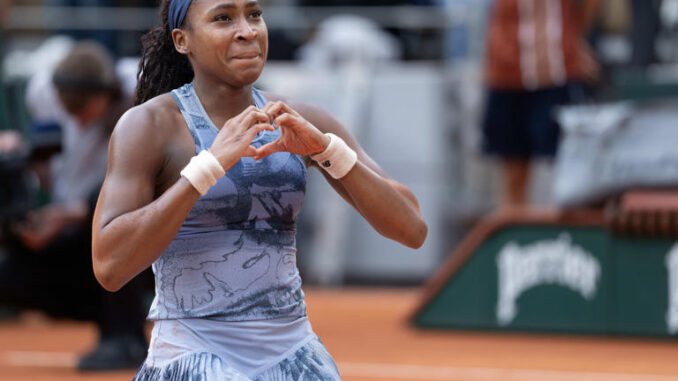
The grass courts of Wimbledon, hallowed ground for tennis’s grandest dreams, have once again proven a formidable challenge for Coco Gauff. On July 1, 2025, the 21-year-old American, fresh off her French Open triumph, suffered a shocking first-round exit at the All England Club, falling 7-6(3), 6-1 to Ukraine’s Dayana Yastremska. The No. 2 seed, who entered as a contender for the title, was visibly shaken, her performance marred by nine double faults and 29 unforced errors. In a candid post-match press conference, a tearful Gauff opened up about the mental and technical hurdles that led to her defeat, offering insights into her struggle to adapt to the grass and the toll of her whirlwind season.
Gauff’s loss was part of a historic wave of upsets, marking the first time in the Open Era that two of the top three women’s seeds exited in the first round of a Grand Slam, with No. 3 Jessica Pegula also falling to Elisabetta Cocciaretto. For Gauff, the defeat stung deeply, not just for its timing but because Wimbledon holds a special place in her heart. It was here, in 2019, that a 15-year-old Gauff burst onto the scene, defeating Venus Williams and reaching the fourth round in a dreamlike debut. “Even when I see videos of me during that time, it just doesn’t feel like it’s me,” she reflected before the tournament. “It felt like a dream. I’ll always have special memories from that run and, I guess, it definitely fueled the belief that I can be on tour and live out my dream.”
Yet, Wimbledon remains Gauff’s toughest test. Unlike the clay of Roland Garros or the hard courts of the US Open, where she’s claimed major titles, the grass surface has consistently eluded her, with no quarterfinal appearance to her name. Yastremska, ranked No. 42, exploited this vulnerability with aggressive play, slamming 16 winners to Gauff’s mere six. “Dayana started off playing strong,” Gauff acknowledged. “I couldn’t find my footing out there today.” The Ukrainian’s relentless groundstrokes and comfort on grass overwhelmed Gauff, who struggled to adjust her topspin-heavy game to the low bounces and slick surface. Yastremska herself noted, “I was really on fire. I even have fire on my nails,” celebrating her victory with a nod to her confident mindset.
The root of Gauff’s struggles, however, went beyond the court. Coming off her French Open victory just three weeks earlier, where she became the first American woman since Serena Williams to win in Paris, Gauff admitted to feeling mentally drained. The whirlwind of media obligations and celebrations left little time to prepare for the grass-court swing. “I feel like mentally I was a little bit overwhelmed with everything that came afterwards,” she said, her voice heavy with emotion. “So, I didn’t feel like I had enough time to celebrate and also get back into it.” The rapid transition from clay to grass, a challenge even for seasoned champions, proved particularly daunting. “It’s a tricky thing, and it seems like Carlos and Novak are the ones to figure it out,” she added, referencing Alcaraz and Djokovic’s ability to navigate the surface switch.
Gauff’s serve, a cornerstone of her game when firing, betrayed her under the roof of No. 1 Court. Double faults in the first-set tiebreak, including one after a let, handed Yastremska momentum. “When I can serve well, and some games I did, it’s definitely an added threat,” Gauff said, but admitted, “I didn’t serve that well.” Her defensive style, typically a strength, was neutralized by Yastremska’s aggressive shot-making, which pushed Gauff behind the baseline and exposed her forehand’s inconsistency on grass. “I think it’s just changing my playing style a little bit, which is difficult,” she noted, signaling a need to adapt her approach for future grass-court campaigns.
Despite the disappointment, Gauff’s resilience shone through. “I don’t really like losing,” she said, dabbing away tears. “I just feel a little bit disappointed in how I showed up today. I felt like I could have been a little bit better.” Yet, she refused to dwell on the setback, already looking ahead to the hard-court season and the US Open, where she won her first major in 2023. “Maybe losing here [in the] first round isn’t the worst thing in the world,” she said, “because I have time to reset.” Her candor about mental health, a hallmark of her career, resonated with fans, who flooded social media with support, praising her ability to rebound at just 21.
Yastremska, a former Australian Open semifinalist, capitalized on her grass-court pedigree, having reached the Nottingham final earlier in 2025. “Playing against Coco, it is something special,” she said, relishing the upset. For Gauff, the loss is a learning opportunity. With two Grand Slam titles and a career-high No. 2 ranking, her potential remains undeniable. As she prepares for the North American swing, Gauff’s focus is clear: refine her game, recalibrate her mind, and return to Wimbledon ready to conquer its elusive grass.
Leave a Reply